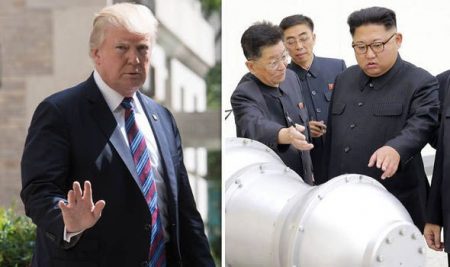WASHINGTON, (Reuters) – President Donald Trump yesterday delivered a more orderly, less haphazard response than he has offered to other provocations by North Korea after Pyongyang conducted a powerful nuclear test that intensified the pressure on his young presidency.
Trump’s handling of Pyongyang’s nuclear test reflected a more traditional approach to crisis management, which U.S. officials said illustrated the influence of the new White House chief of staff, retired Marine Corps General John Kelly, and Defense Secretary Jim Mattis. That included the tone the president struck in some early morning tweets.
A meeting on the crisis that Trump convened yesterday was limited to top aides and generals directly involved. In the past, according to administration officials, White House aides and others wandered in and out of such discussions, contributing to an impression of policymaking chaos.

After the meeting, Mattis, also a retired Marine Corps general, appeared before reporters, along with Joint Chiefs of Staff Chairman General Joseph Dunford, to warn North Korea of U.S. military resolve.
Trump himself was more restrained. Last month, he inflamed tensions by declaring that North Korea might face “fire and fury like the world has never seen.” When asked yesterday if he planned to launch an attack, he said only: “We’ll see.”
“North Korea is a rogue nation which has become a great threat and embarrassment to China, which is trying to help but with little success,” Trump said on Twitter.
A U.S. official who has participated in the discussions of how to respond to the North’s sixth nuclear test, which Pyongyang says was of an advanced hydrogen bomb, told Reuters the U.S. response thus far reflected an improved organization.
“If today’s meeting and the president’s public remarks on Twitter, and the outreach to our allies and others by Rex and others is an early indication, the process is at least more orderly,” said the official, referring to Secretary of State Rex Tillerson.
The crisis is also presenting a test for Kelly, who officials said was trying to rein in the president’s more combative impulses and place limits on who gets access to him.
The Republican president has sometimes chafed at the restrictions his new chief of staff has imposed on the information flow in and out of the Oval Office in a bid to streamline the decision-making process, people familiar with the situation said.
“You can’t manage Trump like that,” said one outside Trump adviser, who predicted the president would eventually tire of the process.
A second official familiar with the situation noted that “Kelly’s influence extends so far.”
“The president is still the commander in chief, and he has his bully pulpit in Twitter,” said that official, who also requested anonymity to discuss internal White House matters.
If there was a discordant note yesterday, it might have been when Trump took to Twitter to admonish South Korea, a key ally, for what he termed a policy of “appeasement” of North Korea.
“South Korea is finding, as I have told them, that their talk of appeasement with North Korea will not work, they (North Korea) only understand one thing!” he said on Twitter.
A former senior State Department official criticized Trump for making the remark.
“It was unseemly, unhelpful, and divisive to gratuitously slap our major ally at the very moment when the threat from (North Korea) has reached a new height,” said the official, who spoke on condition of anonymity.
Mattis has a closer relationship with Trump than do Kelly, national security adviser H.R. McMaster and Tillerson, and had played the leading role in explaining to the president the military options and the dangerous implications of using any of them, the second U.S. official said.
“It’s no accident that it was Mattis who spoke to the media after the meeting,” the official said.
Both officials said Trump had been briefed on North Korea multiple times since taking office in January, but had pushed back against the idea that military action would be so costly that it should remain a last resort.
Most military scenarios predict that a strike on North Korea would bring a massive missile and artillery response against South Korea and its capital, Seoul, resulting in mass casualties.
For now, the strategy emerging in the White House includes greater economic pressure on China to step in to help resolve the crisis, officials said. Beijing denies it has sufficient influence on Pyongyang.
The effort was signaled by Treasury Secretary Steven Mnuchin, who told “Fox News Sunday” that he was drafting a sanctions package in which “anybody who wants to do trade or business with them (North Korea) would be prevented from doing trade or business with us.”
China is North Korea’s biggest trading partner. A recent round of U.S. sanctions targeted some Chinese financial institutions, but administration officials said a broader effort was being contemplated.
Whether Trump would launch such an effort is far from clear. He has sought to impose tariffs against Chinese steel imports but has been persuaded by his advisers not to take such a step because it could start a trade war.

